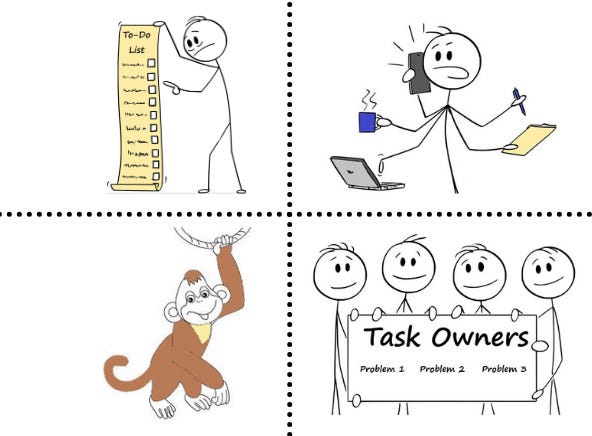Happy Thursday, 👋
Startups are chaotic. A thousand things need doing, and there’s never enough time. Founders often feel buried in to-do lists, constantly reacting instead of leading. But there's a simple shift that can dramatically improve progress: ownership.
Consider two scenarios:
A team member spots a problem in the prototype and mentions it to the founder.
Scenario one: the founder thanks them and says, "Let me think about it and get back to you."
Scenario two: the founder replies, "Put together a few possible solutions and let's chat about it in a few days."
Both responses might seem reasonable. But only one creates forward momentum. In the first, the problem becomes one more thing on the founder's plate. In the second, the founder delegates ownership of the task and progress begins.
This is the essence of ownership within a team. Every task, challenge, and problem needs an owner. Without one, everything falls on the founder, and eventually, nothing moves forward.
Ownership vs. Doing the Work
Ownership doesn’t always mean doing the work. It means making sure the work gets done. For example, a product manager may not be physically modifying a prototype, but they ensure the engineering team has clear specs, deadlines are aligned, and any roadblocks are removed. Task owners act more like facilitators: they provide direction, communicate expectations, and are ultimately accountable for results. Ownership creates clarity, aligns the team, and helps prevent things from slipping through the cracks or getting stuck on someone's to-do list.
Who Has the Monkey?
There’s a classic 1974 Harvard Business Review article that compares problems to monkeys. Every issue is like a monkey jumping onto someone’s back. When a team member brings up a problem and the founder says, "I’ll take care of it," that monkey now sits on the founder’s shoulders.
Soon, the founder is walking around with a dozen monkeys, feeding them, caring for them, trying not to drop any. It’s unsustainable.
Instead, the question should be: "Who owns this monkey?" The monkey doesn’t always stay with the person who found it, but someone has to take responsibility. Too often, founders take on extra responsibilities by default, even when they have a capable team ready to help. It's a quirky analogy, but it highlights the risk of one person trying to own everything. Every monkey, or task, needs an owner, but one person cannot care for them all.
Why Founders Struggle to Delegate
Founders, especially early in their journey, often believe they can care for all the monkeys themselves. In the beginning, it might even feel admirable, even efficient, to be involved in everything. But this approach does not scale. Eventually, caring for too many monkeys slows progress and burns out the founder.
Delegation can feel uncomfortable. Founders worry: Will this monkey be fed properly? Will it get the attention it needs? There’s a fear that no one else will handle the problem with the same care or urgency. We get it, it’s hard to let go, especially when you've nurtured that monkey from the beginning. But if you want the company to grow, those monkeys need to be shared. Otherwise, you're not leading a team; you're running a petting zoo.
Build a Dashboard
One of the simplest ways to build ownership into your team is by creating a dashboard. At a basic level, it can include fields like the task or project name, who owns it, current status, and any key deadlines. This helps ensure everyone knows what’s being worked on, who’s responsible, and where things stand. It doesn’t need to be fancy, a shared doc or spreadsheet works just fine. What matters most is clearly identifying each initiative or problem and ensuring there’s a single accountable owner.
Review this dashboard during weekly team meetings. Use it to check progress, flag stalled tasks, and make sure the workload is balanced across the team. If someone is overloaded, help them delegate or redistribute responsibilities.
We often find that building a simple task ownership dashboard eases the concerns of founders hesitant to delegate. It helps them maintain visibility into the various tasks without having to take direct ownership. This allows founders to transition more responsibilities to the team without worrying that something will be missed.
Final Thoughts
Startups succeed when teams move fast, make clear decisions, and maintain momentum. Real progress starts to happen when more people than just the founder take ownership of tasks or problems. But this shift doesn't happen on its own, it requires a deliberate change in how the team approaches responsibility and communication.
Problems can be like monkeys jumping between people, disrupting workflows and creating confusion. Until someone steps up to take ownership, the chaos compounds. It’s not easy to give up control. But if everything continues to land on the founder’s to-do list, the company can only grow as far as one person’s capacity. Exponential growth only happens when ownership scales across the team.
When momentum starts slipping, ask the most important question: who owns this?
Because no matter how smart or fast your team is, progress only happens when someone is truly accountable. Ownership drives execution, and it's execution that drives success (and keeps the monkeys happy).
Wishing everyone a great weekend,
-Eric.



